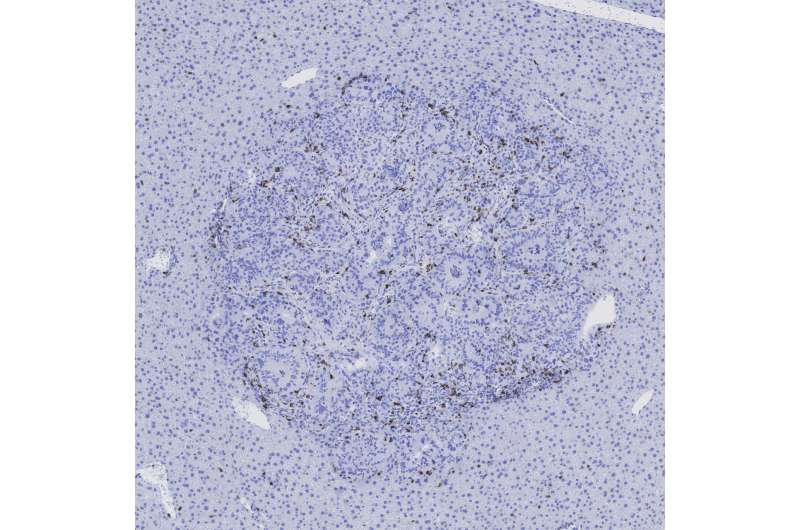Team paves the way to the use of immunotherapy to treat aggressive colon tumors

In a short space of time, immunotherapy against cancer cells has become a powerful approach to treat cancers such as melanoma and lung cancer. However, to date, most colon tumours appeared to be unresponsive to this kind of therapy. Given this observation, researchers hypothesized that this kind of tumour was simply invisible to the immune system. In a study published today in the journal Nature, a team headed by ICREA researcher Eduard Batlle, at the Institute for Research in Biomedicine (IRB Barcelona), explains that the hormone TGF-beta is responsible for the "blindness" of the immune system to colon cancer cells.
"The few clinical immunotherapy trials done in patients with the most common subtype of colon cancer were not giving good results, and we didn't understand why this was happening," explains Eduard Batlle.
By inhibiting the activity of TGF-beta, the cells of the immune system infiltrate and recognise the tumour, fight the cancer, and even stop colon tumours from metastasizing to the liver and lung in a preclinical mouse model that mimics the human disease. In addition, and more importantly, the researchers demonstrated that the combination of a TGF-beta inhibitor with available immunotherapies boost the anti-tumour effect, allowing the immune system to efficiently eliminate already established metastases that would otherwise kill the individual in a question of weeks.
Scientist Daniele Tauriello, postdoctoral fellow and first author of the article, induced four of the most common mutations present in advanced human colon tumours in mice. "The development of the animal model took us four years, but we hit the nail on the head," he says.
After confirming the similarity of the mouse tumours with those in humans, they built a biobank of tumour organoids—3-D mini-tumours—and grafted them in a controlled manner in immunocompetent mice. "For studies of the immune system, the tumour has to be of mouse origin. Otherwise, the animal would reject it," he explains. This animal model, which mimics the main features of metastatic colon cancer in humans, allowed the researchers to examine how cancer cells evade the immune system.
Beyond colon cancer
Around 40 to 50 percent of colon cancer patients relapse in the form of metastasis, with the tumours reproducing mainly in the liver and lung. "Once advanced stage colon cancer is diagnosed, oncologists do not have access to efficient treatments to cure the patient," explains Eduard Batlle. This study paves the way for the development of the first immunotherapy treatment for patients with metastatic colon cancer and for those patients with poor prognosis but who have not yet developed metastasis.
Oncologists and pharmaceutical companies will soon start clinical assays that combine TGF-beta inhibitors, which are already in clinical use, with immunotherapies. The researchers are convinced that many colon cancer patients will benefit from this therapeutic strategy.
In the same issue of Nature, another study addresses the lack of response of bladder cancer patients to immunotherapy. Conducted by the U.S. pharmaceutical company Genentech, this study draws the same conclusions as Batlle's team. "This second study demonstrates that the discovery goes beyond colon cancer. It appears that many types of tumour use the same strategy—increasing the expression of TGF-beta in the environment—to evade the immune system. Patients with these tumours may also benefit from immunotherapies based on the inhibition of this hormone," Batlle says.
More information: Daniele V. F. Tauriello et al, TGFβ drives immune evasion in genetically reconstituted colon cancer metastasis, Nature (2018). DOI: 10.1038/nature25492


















